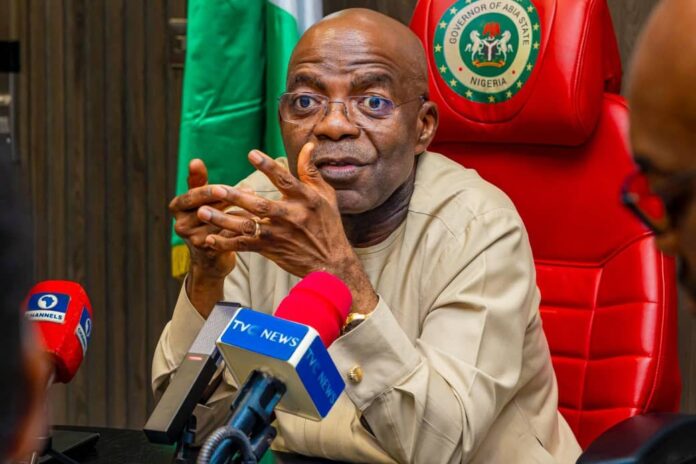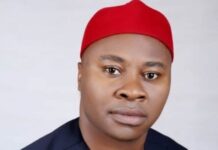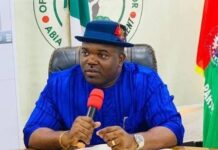By Elder Abraham Amah
On Friday, October 3, 2025, Abia State was filled with anticipation. President Bola Ahmed Tinubu was scheduled to visit on the invitation of Governor Alex Otti to commission what the state government had described as landmark projects. The invitation was not just ceremonial; it was meant to serve as a symbolic endorsement of a government eager to display its achievements, and a federal administration willing to celebrate the results of its bold economic reforms. It was an opportunity for both leaders to showcase the dividends of a historic fiscal shift—particularly the removal of the controversial fuel subsidy, which had for decades drained the nation’s wealth and crippled infrastructural growth.
But the expected drama never unfolded. The President did not arrive. Even the Vice President was not delegated to represent him. Instead, the Minister of Works, Engr. Dave Umahi, stood in on behalf of the President. That singular act of substitution altered the entire political temperature of the state and provoked a flurry of interpretations. To some, it was a slight—an unspoken message that the federal center was unimpressed with Otti’s projects. To others, it was a mere scheduling adjustment. Yet to those who understand the subtleties of power and symbolism, it was a profound message: performance must be verifiable before it can be celebrated.
In the theater of governance, presence confers legitimacy, while absence questions authenticity. When a President commissions a project, he lends it the weight of national approval. When he chooses not to, he is making a statement—that the work must first pass the test of substance. Tinubu’s decision not to appear was therefore not an act of hostility but of principle. It was a quiet reaffirmation of a new order where governance must be measurable, results must be tangible, and accountability must replace political theatre.
President Tinubu has built his administration on a philosophy of earned recognition. Since assuming office, he has dismantled the most sacred cow in Nigeria’s economic history: the petroleum subsidy. For decades, that single policy served as a vast canal of corruption, draining over ₦12 trillion between 2011 and 2022 and leaving little room for meaningful development. Tinubu’s courage in ending the subsidy not only stopped the hemorrhage—it liberated the federation account and gave the states a new lease of life.
Today, the figures speak louder than propaganda. Under the previous administration of Governor Okezie Ikpeazu, Abia’s highest FAAC allocation in 2023 was about ₦4 billion, roughly $5 million at the time. In 2025, under Governor Alex Otti, that figure now stands at ₦35 billion—around $25 million. This represents a staggering 500 percent increase in dollar terms and over 600 percent in naira value. No state in Nigeria can claim that such astronomical growth came from local ingenuity alone. It was the direct result of Tinubu’s fiscal revolution—his audacity to end subsidy theft, expand the tax net, harmonize foreign exchange, and enforce accountability.
Representative Ben Kalu, the Deputy Speaker of the House of Representatives and an Abia son, dared to articulate this truth. He pointed out that the Otti administration’s supposed transformation was inseparable from the increased federal inflows generated by Tinubu’s reforms. For that act of honesty, he was attacked. The Otti media team accused him of jealousy and political ambition, even attempting to trivialize the argument by comparing his parliamentary impress allowance with the FAAC allocation to Abia. It was a shallow and desperate deflection.
Ben Kalu did not malign Otti. He merely drew a line of truth between cause and effect. Without Tinubu’s reforms, no governor would have had this kind of fiscal room to maneuver. His statement was not political; it was patriotic. But truth in Nigeria is often punished before it is understood. The attacks on Kalu reveal how far our politics has sunk into sentimentality, where facts are treated as offenses and gratitude as weakness.
The irony is that Otti could have embraced the truth with grace. Acknowledging Tinubu’s reforms as a catalyst for Abia’s progress would have demonstrated humility and strategic wisdom. Instead, his reaction was defensive, revealing a thin skin for criticism. If the President’s absence embarrassed the state, the reaction of the governor’s media team embarrassed reason itself. Rather than confront the question—what has Abia truly done with the unprecedented inflows?—they resorted to scapegoating those who dared to ask.
Let us be clear: the performance of the Otti administration must be measured not by press conferences but by proportionality. A sixfold increase in allocation must translate into a sixfold improvement in living conditions. That is the moral and economic logic of leadership. With ₦35 billion flowing monthly into the state treasury, Abia should by now be pulsating with construction energy. Roads, hospitals, schools, and industrial clusters should be springing up with transformative speed. Yet, most of what we see are cosmetic facelifts in urban centers, while rural communities remain neglected. The disparity between the rhetoric of renewal and the reality of impact is becoming impossible to hide.
The President’s decision to send his Minister instead of appearing in person, therefore, carried philosophical weight. It was a refusal to endorse unverified accomplishments. Tinubu’s administration has set a standard: performance must be visible, measurable, and sustainable before it earns presidential attention. To have flown to Abia to commission ordinary road patches or re-painted roundabouts would have diluted the very principle he is trying to institutionalize—governance by results, not by ritual.
In truth, Abia is not without federal attention. There are major federal projects ongoing under Tinubu’s government: the rehabilitation of the Aba-Port Harcourt Expressway, the expansion of the Umuahia-Ikot Ekpene Road, multi-billion-naira TETFund interventions at Abia Polytechnic, the newly approved Federal University in Abia, and the active South-East Development Commission chaired by Chief Emeka Wogu, another illustrious Abia son. To claim that the Tinubu administration has ignored Abia is both unfair and ungrateful.
The economic philosophy behind Tinubu’s reforms is transformative. By dismantling the subsidy regime and broadening the national tax net, he has returned fiscal power to the states. He has dismantled the old culture of excuses where governors cried “no money” while squandering little resources on recurrent bills. Today, the states are empowered—and exposed. Tinubu has democratized abundance and, in doing so, placed the burden of accountability squarely on the shoulders of every governor.
What this means is simple: a new era of economic morality has dawned. The governors now have the resources; the people must now demand the results. In Abia, that question is legitimate and urgent. If ₦35 billion is coming in every month, then the people deserve evidence of proportionate transformation. They deserve not mere roads, but industries; not slogans, but systems.
Ben Kalu’s intervention must be understood in this context. He was not scoring political points but calling attention to the truth that Tinubu’s reforms have given Abia a new chance. As Deputy Speaker, he is constitutionally obligated to defend national policy integrity. He reminded Abians that the prosperity they now boast of is a fruit of federal courage, not local populism. For that, he deserves commendation, not condemnation.
The broader philosophical truth is that Tinubu’s presidency has redefined the relationship between the center and the states. He has given them the tools of prosperity and withdrawn the alibi of poverty. He has shifted the moral balance of Nigerian federalism. Those who build wisely on this foundation will rise as models of progress; those who waste it in propaganda will be exposed by time.
Otti’s administration has a choice—to build on this new foundation with humility and partnership or to squander it in arrogance and defensiveness. The President’s absence was not an insult but an invitation—to self-reflect, to improve, and to deliver results that can command federal presence without begging for it. In governance, as in life, recognition is earned, not requested.
The people of Abia must now begin to separate motion from movement, noise from progress, propaganda from performance. A state that once cried for help now receives enough to transform its destiny. Whether that destiny is realized will depend not on Abuja but on Umuahia.
History will not remember who invited the President or who was attacked on social media. It will remember who told the truth when it was dangerous to do so. Ben Kalu has done that. Tinubu has done that. And Abia must learn from that.
The lesson is simple yet eternal: gratitude is the beginning of progress. Acknowledging those whose courage paved the way for prosperity is not weakness—it is wisdom. President Bola Ahmed Tinubu has rewritten the fiscal story of Nigeria. He has freed the states from financial bondage. It is now up to the governors to prove that freedom can produce fruit.
When the President eventually visits Abia, it should be to celebrate transformation that is undeniable, not to endorse illusions. Until then, the message of his absence remains clear: governance is not performance until the people can feel it.
As Scripture declares, “You shall know the truth, and the truth shall make you free.” The truth has been spoken. Ben Kalu said it. Tinubu enacted it. Abia must now live it.
Elder Abraham Amah
Columnist, Political Philosopher, and Public Affairs Analyst












